
On the hunt for Vladimir Putin’s ex-wife and her Ironman husband
The apartment belongs to the husband of Russian President Vladimir Putin’s ex-wife, but the man who answers the door tells me it could be mine — for a price.
He’s stocky, dressed in a tight white T-shirt, and he speaks with a Russian accent. He introduces himself as Vladimir and says he’s a business partner of Artur Ocheretny, the apartment’s owner, and could broker a deal if someone were interested in buying. With him is a skinny woman with long blond hair and a little boy. Behind them stretches a narrow hallway, beyond which I catch a glimpse of a luminous apartment.
Located a 20-minute walk from the beach in Marbella, a resort city on Spain’s celebrity-studded Costa del Sol, the unit was worth some €1.1 million when it was bought in 2014 and property prices have only risen since. “This is a big, big apartment,” Vladimir says. “It’s absolutely new.” He promises to arrange a visit.
I can’t believe my luck. For weeks, I’ve been investigating the European luxury property that Lyudmila Ocheretnaya — Putin’s ex-wife — and her husband have accumulated in the decade or so since her marriage to the Russian president fell apart.
Since the divorce, Ocheretnaya has led an intensely private life; even her marriage in 2015 to Ocheretny — an Ironman triathlon aficionado more than 20 years younger than her — was kept secret until journalists discovered she had changed her last name. A tour of their apartment would offer a peek into how they’ve been living, as well as a look at what millions of euros of Russian money can buy.
It’s not hard to see why the Ocheretnys might have wanted to put the apartment on the market. The couple is not on the European Union’s sanctions list, but that could quickly change; after all, London has already put Ocheretnaya and her adult children under sanctions. If Brussels followed suit, it could put the apartment and the rest of their European portfolio suddenly out of reach.
I never got to speak with Ocheretnaya or her husband as I crisscrossed the Continent on the trail of their real estate investments. But what I found during my pursuit raised questions about what exactly it takes to put somebody under sanctions. It also revealed how the conversation is changing, as the EU grapples with how to deal with the vast amounts of often illicitly gained funds that flowed in almost unregulated before the war upended the cozy relationship between Russian money and some of Europe’s most luxurious destinations.
Happy marriage
It would be hard to get much closer to the Russian president than the Ocheretnys. Lyudmila was married to Putin for some 30 years, during his rise from obscurity to the most powerful person in the country.
The two married in 1983 when Putin was a low-level KGB officer in Leningrad (now Saint Petersburg) and Lyudmila was a flight attendant for Aeroflot. She followed him to Dresden, East Germany, where he was posted as an agent. After the fall of the Berlin Wall, the couple and their two daughters moved back to Saint Petersburg, where Putin started his political career as an official in the mayor’s office.
As a political spouse, Ocheretnaya — then called Lyudmila Putina — kept a relatively low profile. She pursued her own career until Putin was elected prime minister and then helped create and run a center dedicated to the promotion of the Russian language. Putina attended the occasional state dinner and performed other first lady duties like opening the Christmas tree ceremonies in the Kremlin, but generally she stayed out of the limelight.
“It’s hard to imagine, but at the time, they looked both quite provincial, quite unsure of how to behave,” said Nina Khrushcheva, a professor of international affairs at The New School in New York and the great-granddaughter of former Soviet leader Nikita Khrushchev. “Her dressing I remember … was a bit off, although she tried to employ the best Russian clothes designer,” she said.
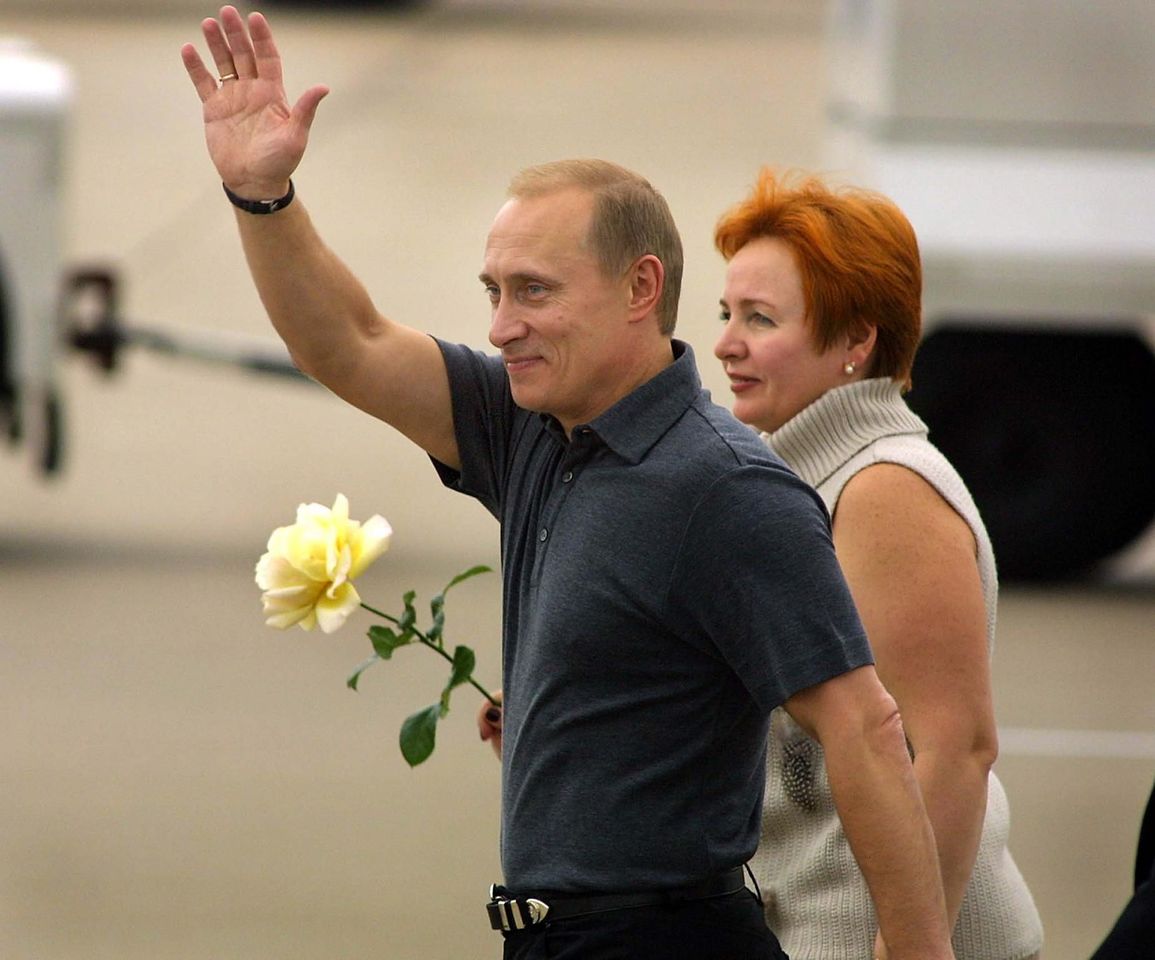
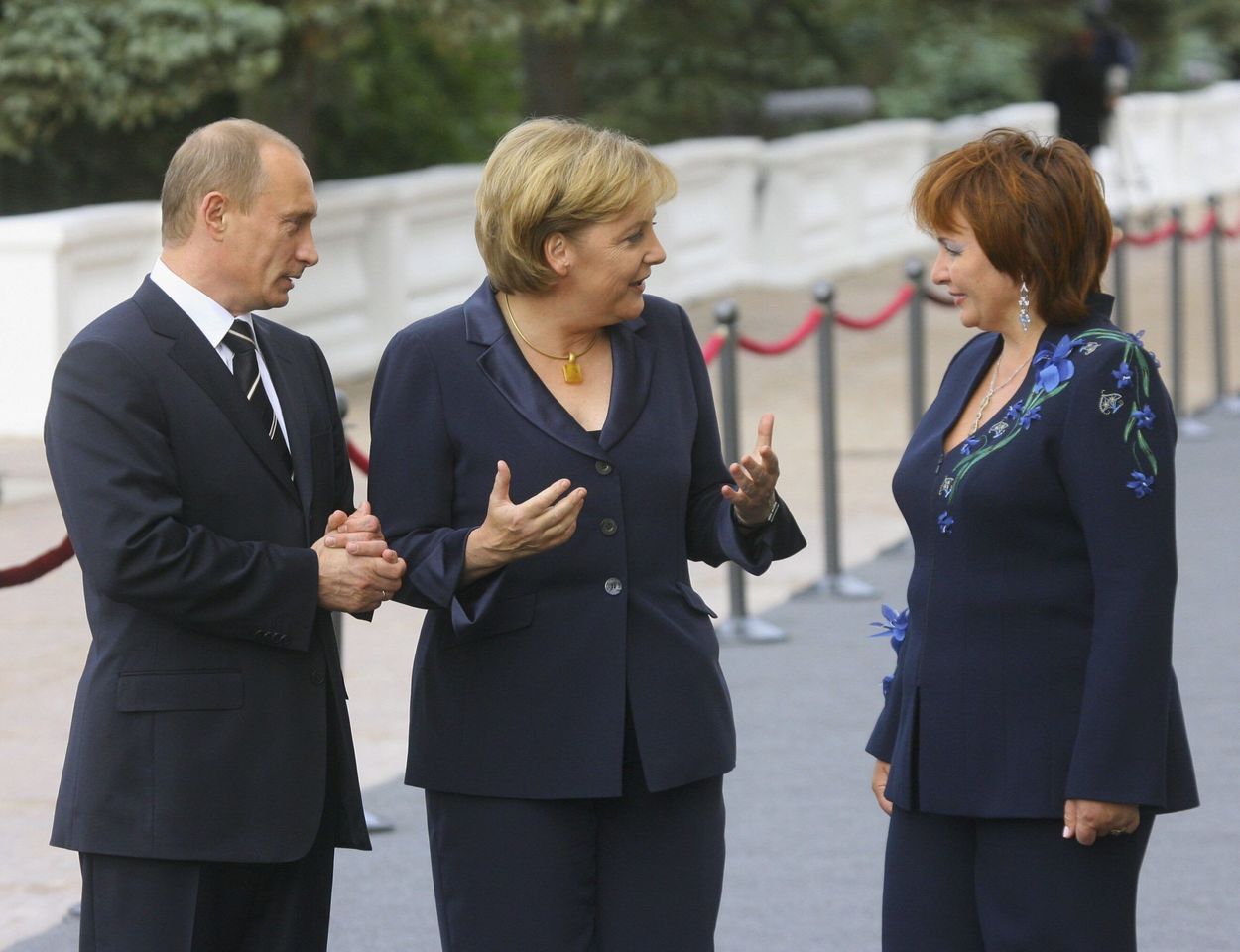
 Russian President Vladimir Putin and then-wife Lyudmila in Texas in 2001, with Angela Merkel in 2006 and in Moscow in 2012
Russian President Vladimir Putin and then-wife Lyudmila in Texas in 2001, with Angela Merkel in 2006 and in Moscow in 2012
As Putin consolidated power, reports, quickly denied, began to emerge of other women in Putin’s life, including the Olympic gold medalist gymnast Alina Kabaeva. Ocheretnaya became “almost invisible,” Khrushcheva said. “Gradually, she started getting off the stage … and he was appearing more and more alone.” Then in 2013, the couple stopped to address a television crew as they left a ballet performance at the Kremlin. Their marriage was over, they announced, by “common decision.”
The marriage may have ended, but aspects of the relationship — in particular, its financial component — continued.
When Putin was asked by the state news agency in 2014 whether he was planning to remarry, the Russian president responded with a joke: “I need to marry off my ex-wife Lyudmila first and then I will think about myself.”
As part of her efforts to promote the Russian language, Ocheretnaya had set up a foundation called the Center for Development of Russian Language, later rebranded and repurposed as the Center for Development of Inter-personal Communications. In 2016, Russian media revealed she had married Ocheretny, its chairman.
The foundation came with another perk. During Putin’s rule, it had acquired a former government building in central Moscow that once belonged to the grandfather of the Russian author Leo Tolstoy.
Reportedly the inspiration for a mansion described in the novel “War and Peace,” the Volkonsky House had been renovated and expanded by the government’s property department, which added two new floors to the historic building, according to an exposé by Russian dissident Alexei Navalny’s Anti-Corruption Foundation.
The property was then given to Ocheretnaya’s foundation, and the former first lady seems to have put it to productive use. Located a 5-minute walk from the Kremlin, the building now generates millions of dollars in rent — paid, according to a Reuters investigation, to a company registered in her maiden name.
Ocheretnaya could not be reached for comment.
Costa del Sol
The Ocheretnys’ marriage, unpublicized by either party, took place during a period in which the couple’s real estate portfolio was quickly expanding.
The apartment I was offered to visit in Marbella is one of two in the city that Ocheretny acquired shortly before the wedding. Ocheretny bought the first one in 2011 for some €800,000 and the second in 2014 for more than €1 million. The apartments remain his property, registry documents obtained by POLITICO show.
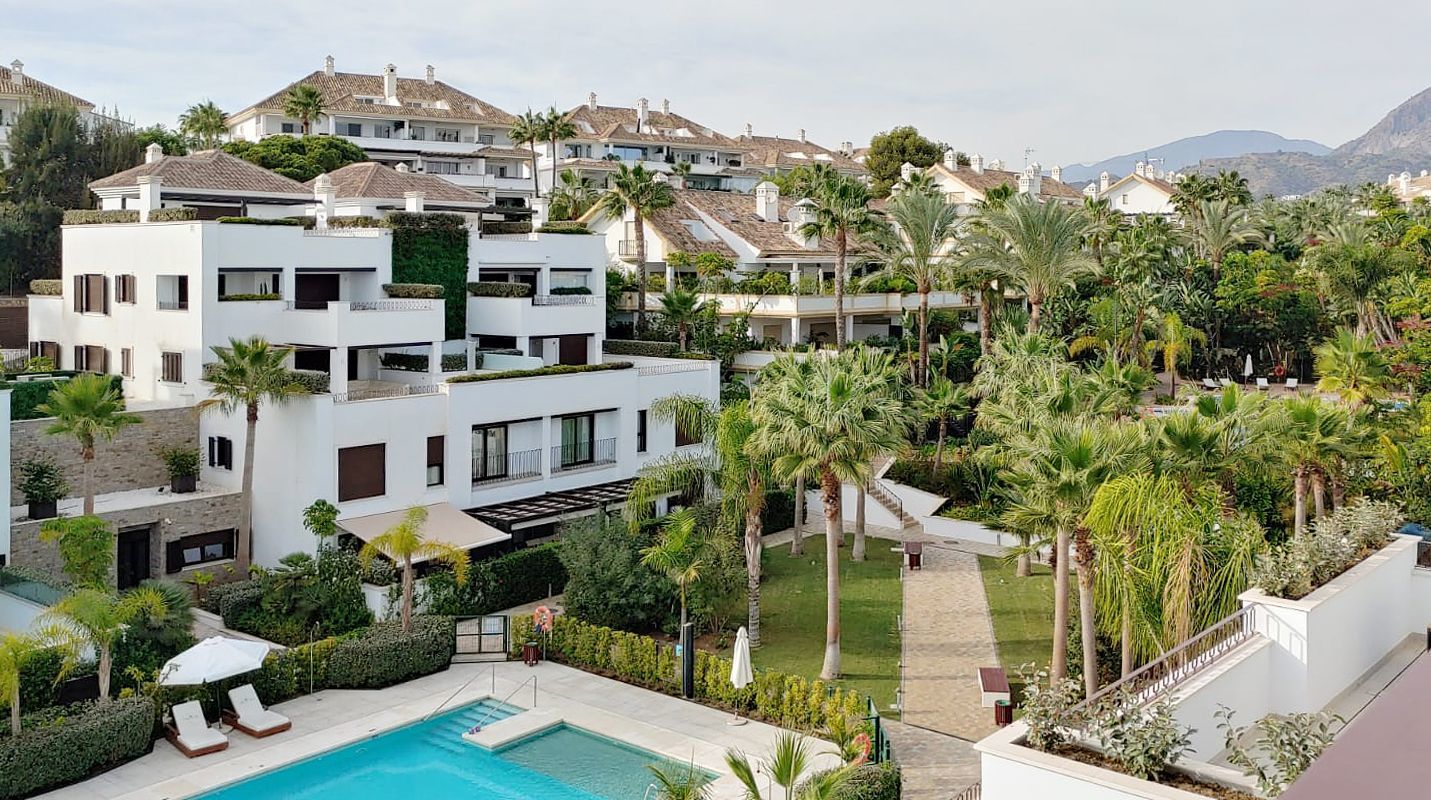 Part of the residential complex in Marbella where husband Artur Ocheretny, Lyudmila’s husband, owns two apartments
Part of the residential complex in Marbella where husband Artur Ocheretny, Lyudmila’s husband, owns two apartments
Marbella-based notary Rafael Requena, who represented Ocheretny during the sale, declined to comment on the purchases, citing Spanish confidentiality rules.
Ocheretny did not respond to requests for comment.
The two units sit in a complex shielded by black gates. No-name doorbells offer little indication of who lives inside. Between the apartments lies a well-watered garden, with access to several swimming pools. In the morning, rabbits nibble on the perfectly cut grass and birds chirp in the trees.
Other people who have owned property in Marbella include the actors Hugh Grant and Sean Connery, television personality Simon Cowell and Rifaat al-Assad, the uncle of Syrian President Bashar al-Assad. Putin owns a villa in neighboring La Zagaleta, a resort community, according to local media reports.
In recent decades, the area has become a magnet for Russian money, according to Javier de Luis, a real estate expert at the grassroots confederation Ecologists in Action. Some 3,000 Russians officially live in Marbella, he said, adding that he thought the real number was much higher.
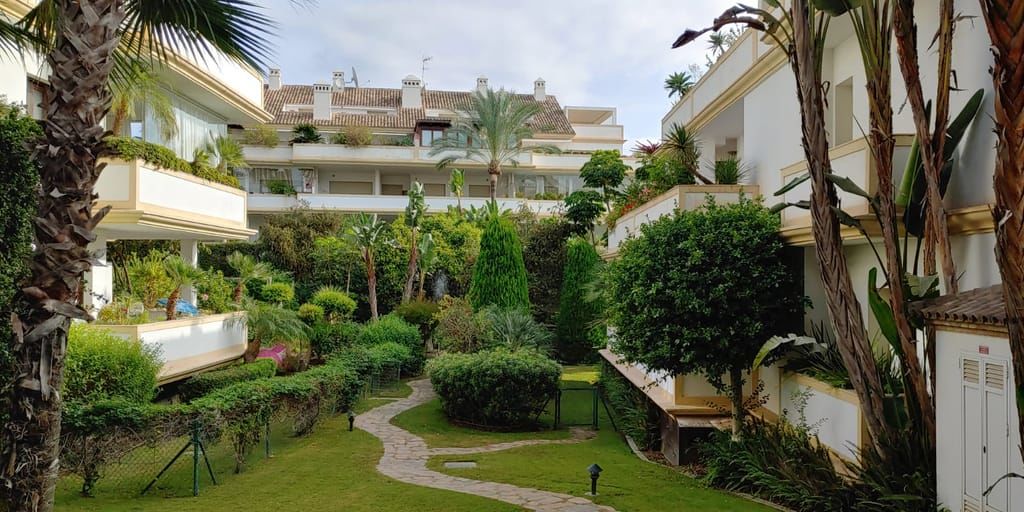
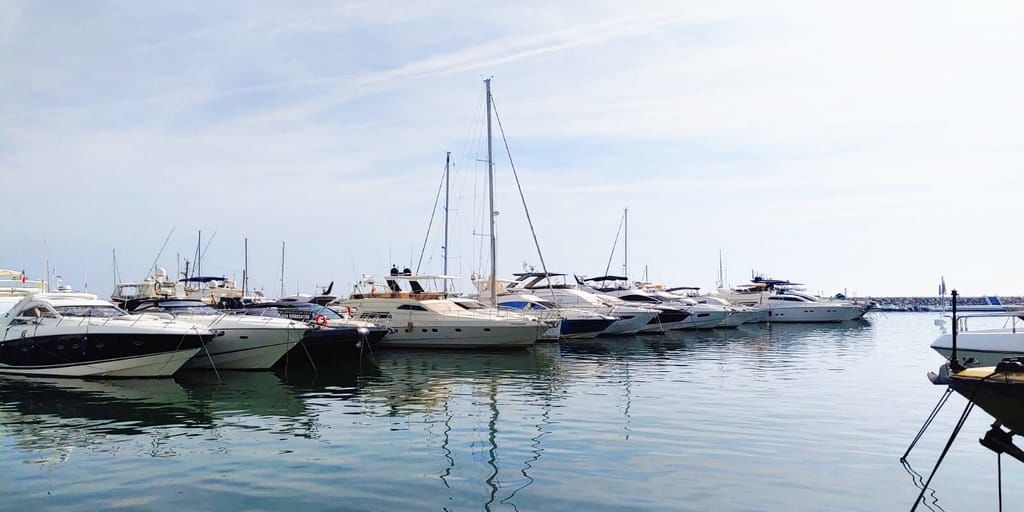
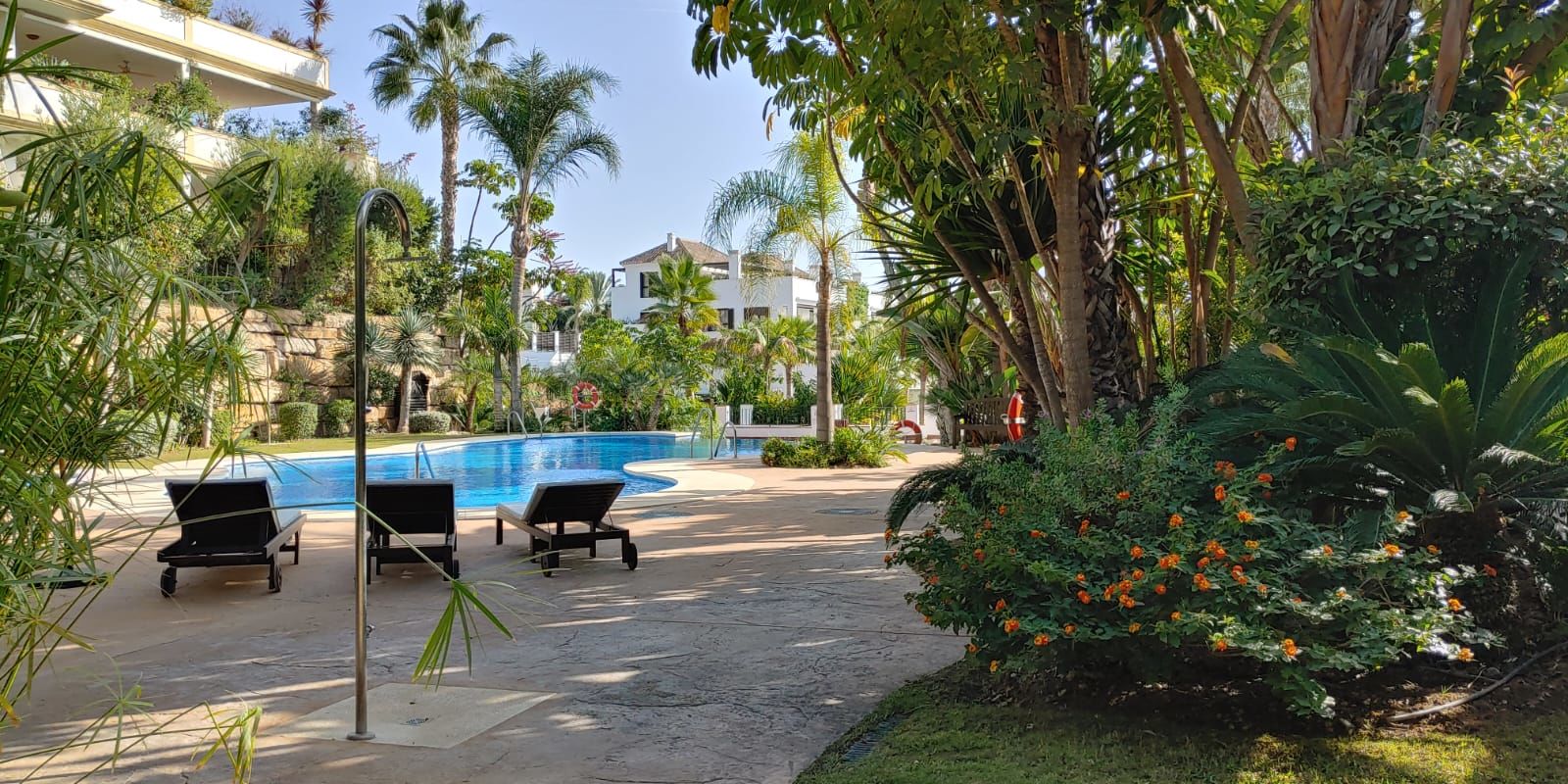 Lyudmila’s husband bought an apartment in this complex in Marbella
for some €800,000 in 2011 and a second one in 2014 for more than €1
million
Lyudmila’s husband bought an apartment in this complex in Marbella
for some €800,000 in 2011 and a second one in 2014 for more than €1
million
“Many Russians put their money into property as an investment. They buy, they sell — it’s an income source for them,” de Luis said. For those looking to conceal the source of illicitly gained funds, the real estate market offers plenty of opportunities to wash them clean. “Money laundering is the oil that greases the machinery,” he said.
In Marbella, this mainly happens by buying construction permits for individual houses or larger projects like hotels — and then selling them before the work has started, de Luis said. Another common strategy in the real estate sector is to take out a loan to buy a property, and then pay it back in smaller payments that receive less scrutiny.
The apartment bought in 2014 could have come with another major perk: Since 2013, Spanish law grants residence permits to those who invest at least €500,000 in Spanish real estate. These so-called golden visas offer unlimited access to travel in the 27 countries in the EU’s Schengen Area and the right to eventually apply for permanent residence in Spain.
Asked whether Ocheretny had availed himself of this scheme, the Spanish interior ministry directed questions to the foreign ministry, which declined to “disclose personal information to third parties.”
Sadly, I wasn’t able to visit Ocheretny’s apartments. The day after I met him, Vladimir texted saying he had misunderstood, and that the owners were only interested in buying, not selling.
“I thought you want to sell apartments of your relatives,” he wrote. “We don’t sell anything. Sorry for the oversight. Have a nice day!”
When asked if he could show the apartment anyway, in case they changed their mind, he answered: “No possible, sorry. These parts definitely will be not sale in the nearest future, we use it and planned to use in future.”
He did not respond to further requests for clarification.
Risky investment
If the Ocheretnys wanted to unload their Marbella real estate, they’d have a compelling reason to do so: They risk losing access to their apartment and their money if they become targets of EU sanctions.
Since Putin’s full-scale assault on Ukraine in February 2022, the United States, the EU and the U.K. have sanctioned hundreds of people believed to be responsible for the war, for spreading pro-war propaganda, or for providing a source of revenue for the Kremlin. The EU has imposed Russia-related sanctions on about 1,400 people and entities, the U.S. almost 2,500, and the U.K. some 1,600.
There isn’t a lot of agreement however over who, exactly, should be targeted. Only 639 people and entities had been sanctioned by all three as of September, according to an analysis of data compiled by the Brookings Sanctions Tracker, which monitors sanctions related to the Russian invasion of Ukraine. These include Putin and Ocheretnaya’s two daughters, as well as the Russian president’s alleged girlfriend, the gymnast Kabaeva — but not the Ocheretnys.
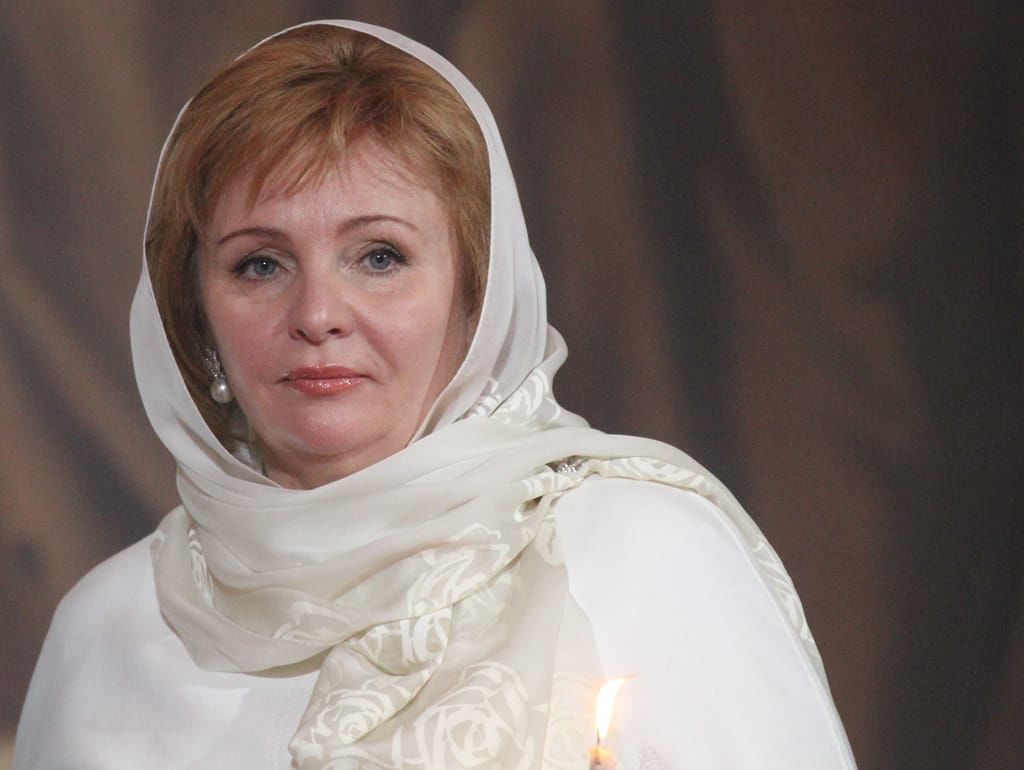 Lyudmila in 2011, when she was still married to Vladimir Putin
Lyudmila in 2011, when she was still married to Vladimir Putin
Ocheretnaya has been sanctioned by the U.K., as part of an effort to “hit Putin’s financial network, tightening the vice on the President and his inner circle” — but the EU and the U.S. have so far left both her and her husband off its list.
Much of the discrepancy on who the U.S., the EU and the U.K. sanction comes down to differences in objectives.
The EU tends not to use punitive sanctions for past actions, according to Viktor Winkler, a lawyer specialized in sanctions policy. Instead, the intent is to prevent those targeted from contributing to further misdeeds, or to stop them from reaping the benefits.
For a person to be sanctioned by the EU, their name must be put forward by a national government and then agreed to by every EU country. Several EU diplomats told POLITICO they were not aware any country had suggested sanctioning the Ocheretnys.
The EU is aware its decisions can face legal challenges. Some 70 oligarchs and their family members have taken the EU to court to get their assets back. Some — like Saodat Narzieva, the sister of the Uzbek-born metals tycoon Alisher Usmanov, and Olga Ayziman, the ex-wife of billionaire Mikhail Fridman — have been quietly dropped from the sanctions list.
Still, the fact that the Ocheretnys have not been targeted by the EU doesn’t mean they never will be.
The international working group on Russian sanctions known as the Yermak-McFaul group suggests that family members of sanctioned individuals also be put on the list to prevent funds being transferred to them — especially if they are living lifestyles inconsistent with their official income, as seems to be the case with the Ocheretnys.
There is no public evidence that Ocheretny has obtained his wealth and properties illegally, but their value appears to outstrip his known sources of income.
And the EU’s foreign affairs chief, Josep Borrell, is expected to present a proposal in June that would allow the bloc to sanction people for corruption. That would make it easier to target people who aren’t directly contributing to the war in Ukraine.
Already, groups like the Anti-Corruption Foundation and the government of Ukraine are also asking that the Ocheretnys be added to the EU’s sanctions list. “We strongly believe that Ms Ocheretnaya shall be sanctioned,” a Ukrainian government official said.
The head of the Anti-Corruption Foundation’s investigative unit, Maria Pevchikh, supports that view. “Of course, I think she should be sanctioned,” she said. “[Putin’s] ex-wife, the woman he spent [decades] with, the mother of the sanctioned daughters, isn’t sanctioned. There is absolutely no explanation of this.”
Swiss secrecy
If there’s one place where people aren’t asking for an explanation, at least not yet, it’s Switzerland. In 2015, around the same time he married Lyudmila, Artur purchased a luxury apartment in Davos — home to the annual World Economic Forum, which has effectively banned Russian participation in response to the war in Ukraine.
Advertised at the time of the purchase for about €3 million, Ocheretny’s apartment sits in an austere gray building just a stone’s throw away from a beautiful lake and is connected by underground tunnels to the towering AlpenGold Hotel, giving its occupants access to the hotel’s pool and its private room for storing skiing equipment.
When I visited in the fall, Ocheretny’s name was on the postbox, and a handful of letters addressed to him were inside. Residents told me he sends a lawyer to their annual building meetings, so they wouldn’t be able to recognize him if they met him on the street.
None of the dozen or so neighbors I spoke to expressed any concern about Ocheretny’s links to Putin or the origins of money. “I don’t care whether my neighbor is a kleptocrat,” one said.
Another concurred: “I don’t like what Putin is doing in Ukraine, but they have every right to own an apartment here.”
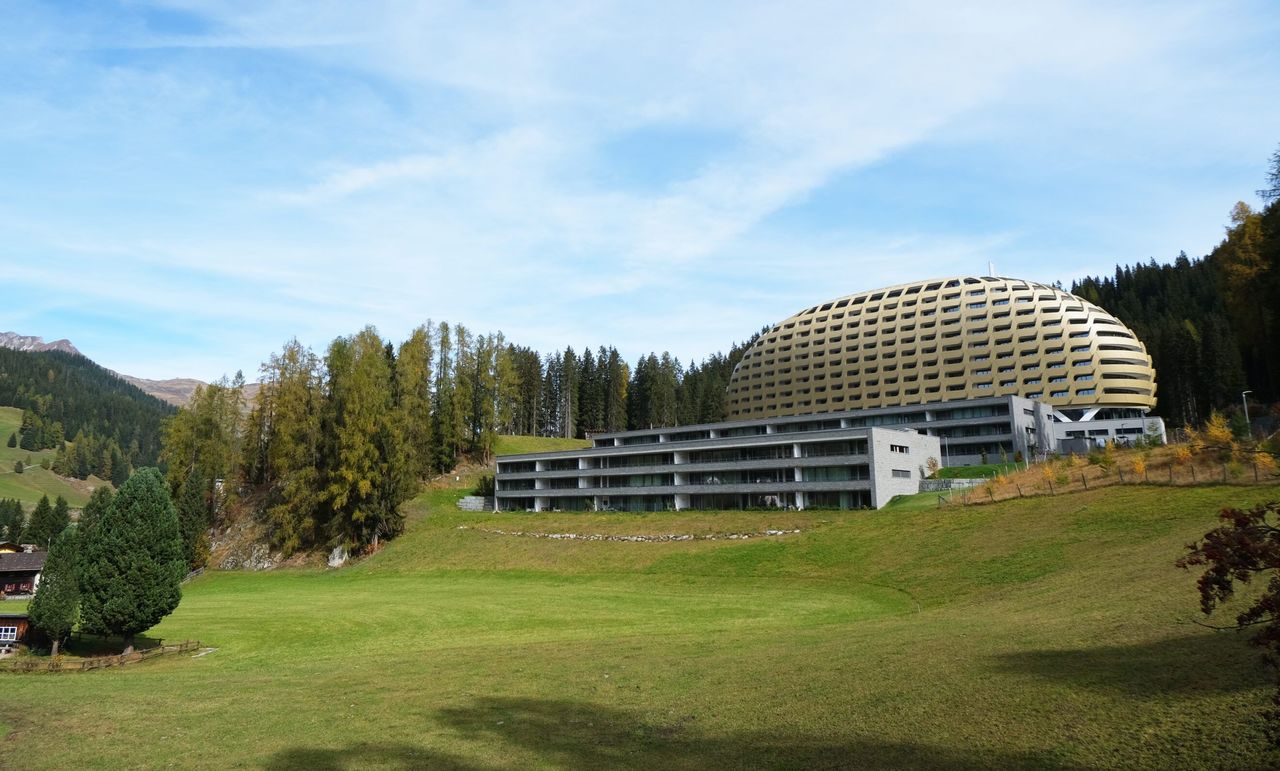
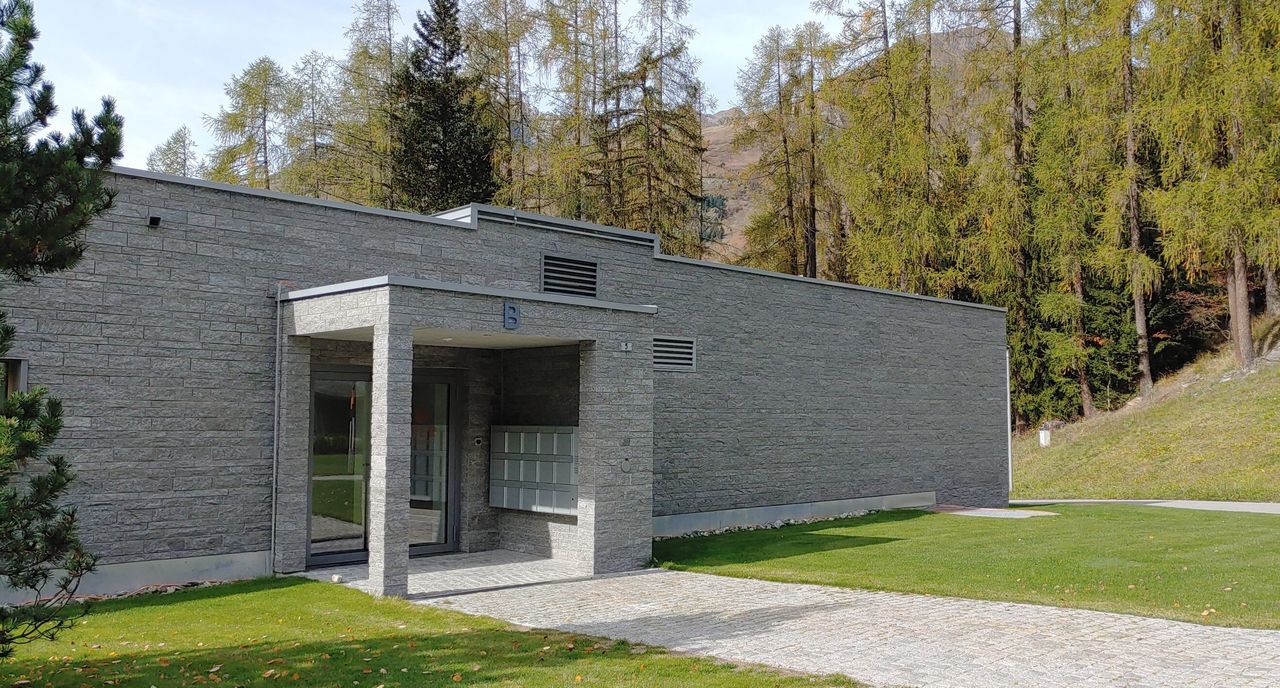 The entrance to Ocheretny’s apartment in Davos. The building, seen above, is in front of the iconic AlpenGold Hotel
The entrance to Ocheretny’s apartment in Davos. The building, seen above, is in front of the iconic AlpenGold Hotel
A third echoed similar sentiments. “Everyone knows she’s got an apartment here,” she said, shrugging while walking her little lapdog. Like almost everyone else I spoke to, she seemed offended by the question. “It’s their private affair,” she said.
“You shouldn’t punish a woman for the actions of her ex-husband — I mean, how is that fair?” said still another.
Just the fact that Ocheretny was able to buy an apartment in Switzerland is unusual. Swiss laws restrict foreigners from buying houses except under a narrow set of circumstances, such as purchasing a new construction as a holiday home, as Ocheretny seems to have done, or if they can demonstrate they work and live in Switzerland.
The trouble in Switzerland is that the law leaves it largely up to private entities to make sure the rules on purchasing are enforced, according to Maíra Martini, a money laundering expert at the corruption watchdog Transparency International.
Martini said that it’s a “really big red flag” if a person’s official salary doesn’t match the money they have in their accounts. That could have raised alarm bells in Ocheretny’s case, as it’s unclear how he could have afforded a flat and multiple houses with the businesses he declares running.
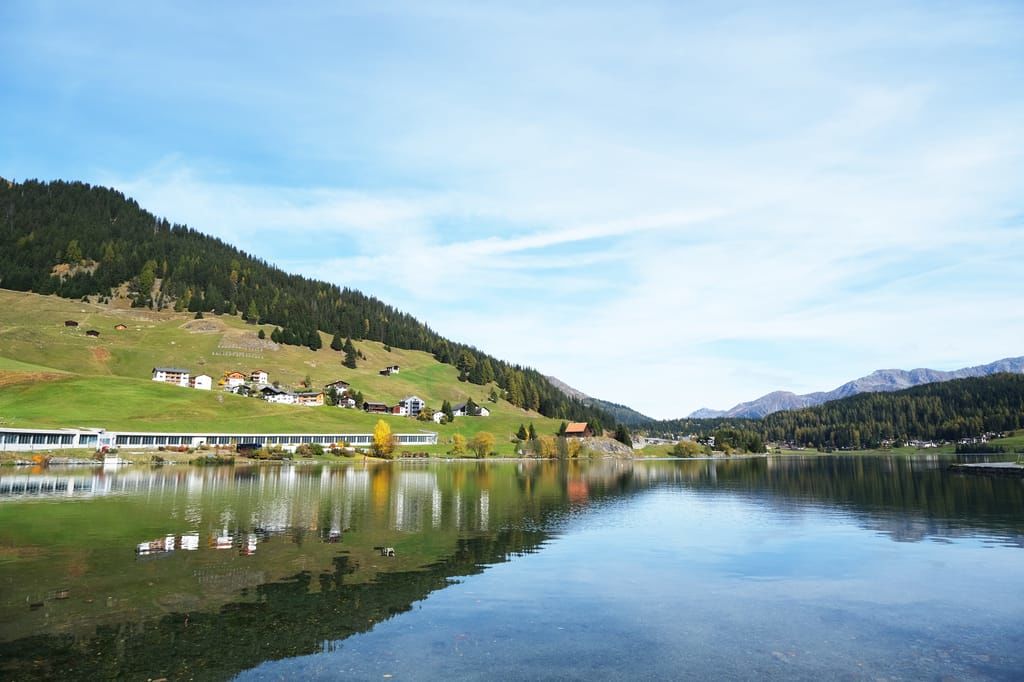 Ocheretny’s Davos apartment is just a stone’s throw away from a beautiful lake
Ocheretny’s Davos apartment is just a stone’s throw away from a beautiful lake
The agency that handles sales in Ocheretny’s apartment complex, Guyan & Co, declined to comment on the record, but another real estate agent in Davos, who requested anonymity due to the sensitivity of the issue, said that agencies didn’t run background checks on who bought their property or from where the customers got their money.
The municipality’s land registry, which keeps track of who owns what in the area, also doesn’t carry out checks on where a buyer’s funds came from.
That leaves anti-money laundering processes largely in the hands of banks — with what might be charitably described as mixed results.
In June, the Swiss banking giant Credit Suisse — which built and owned Ocheretny’s apartment complex — was fined some €2 million for allowing cocaine dealers to launder money through its accounts in 2007 and 2008. And in March, Swiss media reported that the bank asked investors to destroy documents linked to oligarchs’ yachts. Credit Suisse, which has denied those allegations, did not respond to multiple requests for an interview.
Biarritz blues
Not everybody in Europe, however, is as blasé as the Swiss about Russian money.
One of the most remarkable additions to the Ocheretny portfolio is an eccentric Art Deco villa, dubbed Villa Souzanna, some 6 kilometers from the resort town of Biarritz on France’s southwestern Basque Coast — a region in which Ocheretnaya and Putin used to vacation before he became prime minister.
Bought by Ocheretny in 2013, the villa boasts a semi-circular colonnaded front porch adorned with a nautically themed bas-relief. Bright white, it sits on a street that smells of pine trees. The nearest beach is just a stone’s throw away.
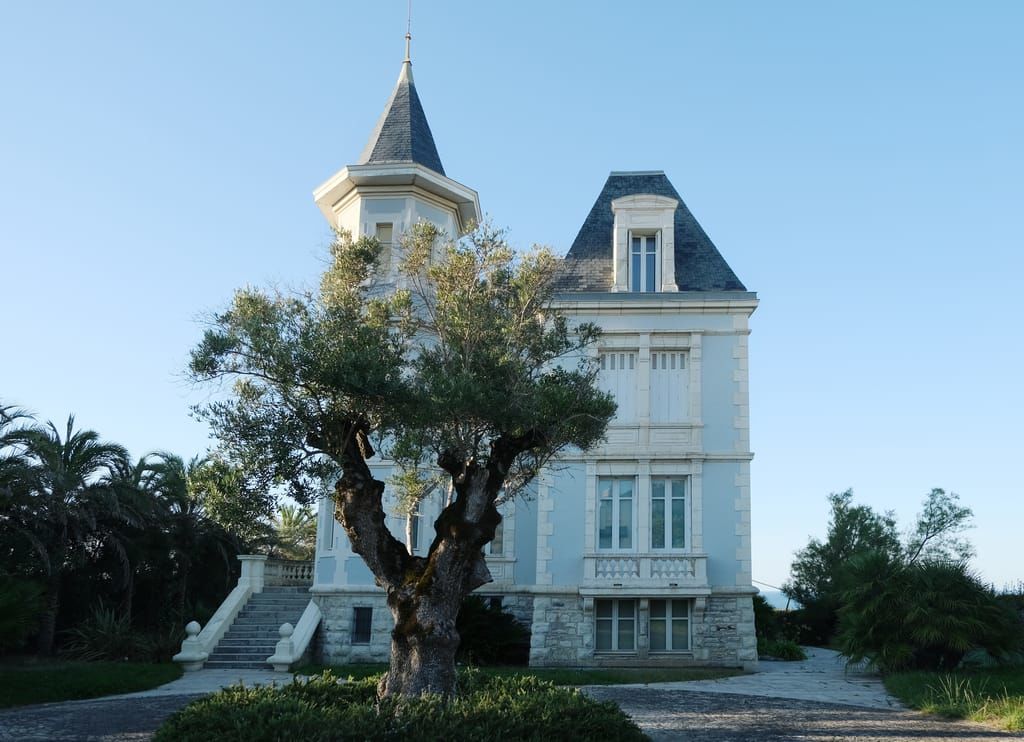 The villa owned by the ex-husband of daughter Katerina Tikhonova in Birarritz
The villa owned by the ex-husband of daughter Katerina Tikhonova in Birarritz
Villa Souzanna is not the only property in town linked to the Russian president. In 2012, Kirill Shamalov, the then-husband of Katerina Tikhonova — Putin and Ocheretnaya’s youngest daughter — bought a €3.5 million house overlooking the sea.
Before the COVID pandemic made travel difficult, Tikhonova was often spotted there, according to a neighbor. Together with her children, she’d come down to Biarritz once a year for several weeks and hang out at the beach just under the house, he said. Her three children were accompanied by three bodyguards — who acted more like nannies than muscly protectors. “She behaved like a normal mother, walking down the beach, tanning,” the neighbor said on conditions of anonymity.
The purchase was made through Sci Atlantic, a real estate company where Shamalov is the director. The house is still owned by the company, records obtained by POLITICO show, but has been confiscated by French authorities after the EU sanctioned Shamalov in April. Shamalov and Tikhonova divorced in 2018.
The Ocheretnys, however, don’t seem to have spent much time in Biarritz — and when they visited, they generally kept to themselves. Around 2018 or 2019, the neighbors spotted the former first lady traveling to the villa with her entourage in three black limousines with tinted windows, Karla Junert, a resident in the area, said.
“I met a neighbor who was super excited telling me, ‘Have you seen them, have you seen them?’” she recounted. By the time she passed by, they had left.
Villa Souzanna has been under construction for some seven years and progress has been slow, the neighbors said. None of them have spotted anyone working on the site since February. “Since the war started, that’s stopped completely,” one neighbor said. Weeds are overrunning the path to the house. The trees have clearly not been tended to in many months. The windows are dusty.
Unlike in Marbella and Davos, where Putin-linked properties have barely elicited a blink, in Biarritz they’ve become the targets of protests.
In March, not long after the Kremlin moved on Kyiv, a pair of Russian activists broke into Shamalov’s mansion, changed the locks and said they would use it to house Ukrainian refugees. The occupation ended after police broke down the door.
Biarritz has a sizeable Russian community but since the war began is has kept a low profile — or been vocally against the war. Several estate agents told me that while the Russian community has always been rather discreet, they’ve completely disappeared from the public. To avoid attracting attention, one of the residents said, they now use license plates from other countries instead of Russian ones.
The Russian embassy in France did not respond to requests for comment.
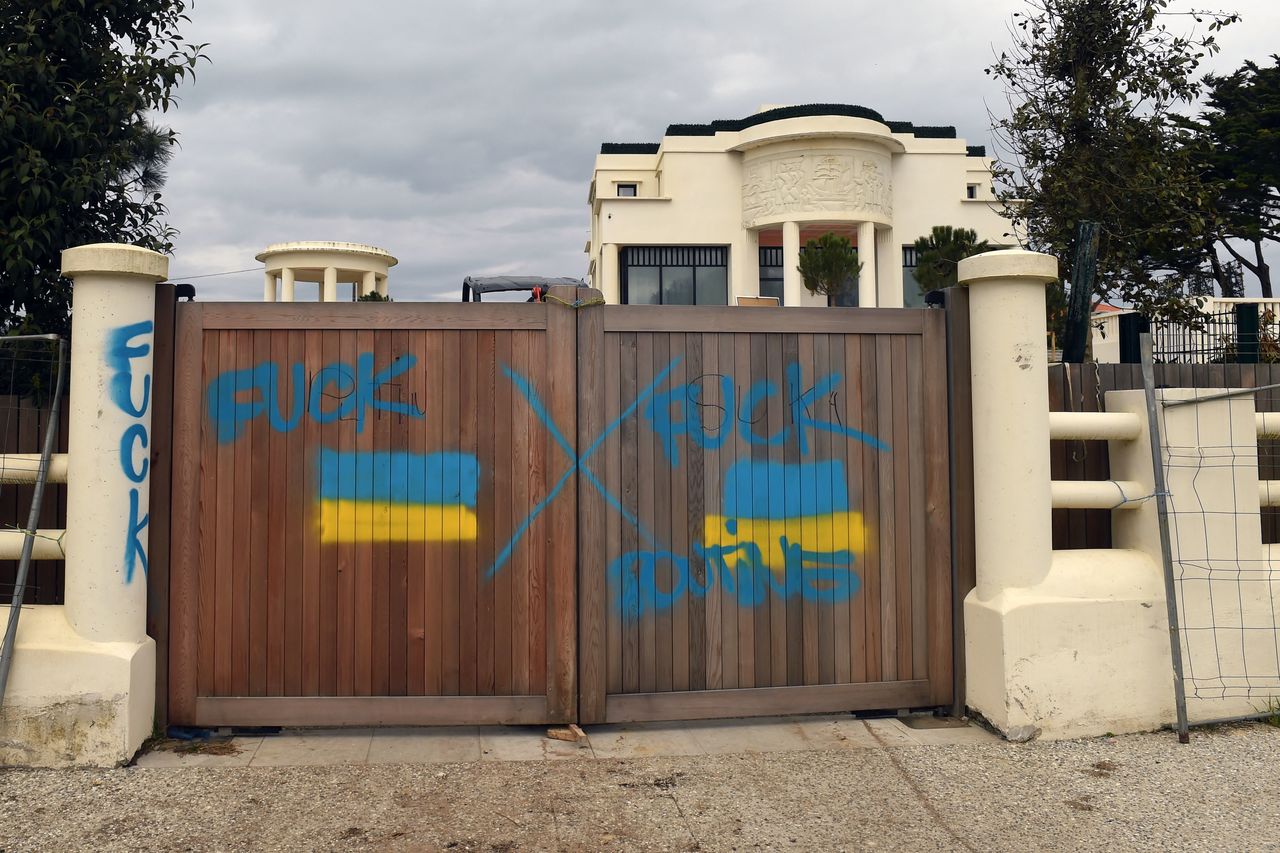 Graffiti on the gate of Villa Souzanna in Biarritz
Graffiti on the gate of Villa Souzanna in Biarritz
The Russian orthodox church on Empress Avenue — affiliated not with the Moscow Patriarchate but the one in Constantinople — is seeing fewer Russians in attendance and more Ukrainians.
The official tide, too, is beginning to shift. The French finance ministry publishes which properties it has frozen — and at the time of writing, some 60 houses and apartments were on the list, and at least some French authorities are pushing for more.
In January, the Directorate General for Competition, Consumer Affairs and Fraud Control announced that spot checks had found that some 60 percent of real estate agencies in the French Riviera were not cooperating with authorities, for instance by checking whether their clients’ names appeared on the EU’s sanctions list and freezing assets when required.
In Biarritz, evidence of the changing attitude toward Russian money could be seen on Ocheretny’s property itself. After the war began, someone sprayed the whitewashed walls surrounding the grounds with FUCK POUTINE and SLAVA UKRAINA (“Glory to Ukraine”) in bright blue and yellow.
Though the walls have since been repainted, the colors still shimmer through.










